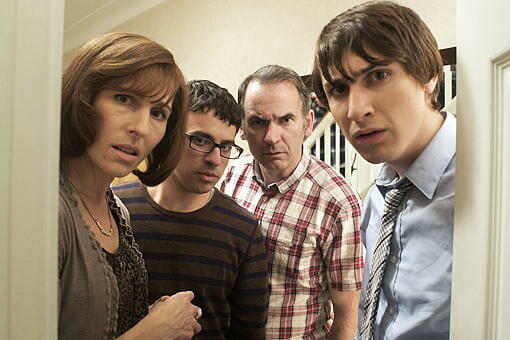Sign up for the
TSL Newsletter
and get $50 off Final Draft 12
By Scott Root · August 1, 2011

BBC America’s newish sitcom (the entire first season has completed its run across the pond) revolves around a shared Friday evening meal. The ensemble cast includes Tamsin Greig as the matriarch and lynchpin of the classic dysfunctional family. Paul Ritter plays opposite Greig as the aging, hearing-impaired father, Martin. Simon Bird and Tom Rosenthal round out the core cast as the pair of brothers, Adam and Jonny respectively. Bird portrays the elder son — a flagging musician. Rosenthal’s younger brother character endlessly torments his older brother with practical jokes and general antagonizing. Mark Heap co-stars as the family’s socially awkward neighbor, Jim.
The premise of the show starts out simply enough. The family meets for dinner every Friday night. However, despite their pursuit for a normal family meal, it eludes their grasp. Though truly an ensemble piece, the story seems to revolve heavily around the elder son Adam. As the elder son, his parents heap undue attention on to his trials. Compound his parents frittering with his brother’s pranks and Adam bears the brunt of the antagonizing in the show.
The central question of the show revolves around the issues of normalcy. Normal is not simply a quite family dinner with people who have nothing more interesting than the weather to talk about. Normal represents the constructed social and perceived psychological states which most people experience on a regular basis. In fact, when it becomes a problem, the psychological name for the syndrome is “normalpathy” (though it’s not recognized by the DSM). It is the utter obsession with achieving a normal state in one’s life. To a certain extent, Adam appears to suffer from the extreme discomfort that normalpathy could bring. His anxiety over what his friends, his family, their scheduled dinners, and even society at large brings him endless suffering. He seems unable, in true British fashion, to appreciate the quirks, which make his family unique.
Adam’s parents’ desires for their son seem simple enough. They want him to meet a nice girl. Due to his sluggish career and bristling personality, Adam has more trouble with this aspect of his life than is warranted. Simultaneously, his brother seeks out ways to make his life unbearable. He tries everything from salting his water at the table to grifting their mother’s cell phone and sending him nasty texts. All the while, in the US premiere, Adam simply wants to hear his music on the radio. He’s written a jingle for an auto insurance company, which will play on the radio later in the evening.
At every turn, Adam meets complications from his family. When he arrives, he peers in the window to find his father looking at his willy with a magnifying glass. Out of the gate, the show opens on a question of “Is this normal?” Jonny arrives and the two make jokes about whether or not their father has grown a second one. Though they have written off the incident with each other, the gnawing doubt infests their mind. The ancient fears about endowment play their part with the boys’ concern about their father’s well being. His hearing already fading, they must consider whether this demonstrates an early sign of dementia. Throughout the rest of the night, the brothers find their father running off to check on himself.
The theme of normality re-surges at dinner, as the entire family badgers Adam for updates on his love life. They refuse to let up on him, claiming to be worried about him, until he relents and commits to looking for girls on the internet with the help of his father. He grows exasperated as the family continues to dig in his personal life. Meanwhile, the brothers deal with the unexpected visit of their neighbor, Jim. He appears at the door with his large German Shepard and asks to see their mother, who must yell across the house that she’s at dinner. Jim seems unable to take the hint and stands awkwardly at the door waiting for her to show up. The boys continue to try to convince him to leave the porch and do something more constructive with his life while he waits, yet he refuses. Jim represents yet another bump in the road to normality as he appears incapable of dealing with any social situation whatsoever.
All of Adam’s concerns about normality come to a head when his father pulls him into the bathroom. Adam worries that his father wants to show him his downstairs problem, and Adam comments on the all out bizarre carnival that dinner has become, saying “Oh, this is normal.” It’s at that point, which Adam has hit the nail on the head. Though he’s using sarcasm as a defense mechanism, what he’s said remains factually true.
It is normal.
Humanity may never have survived if we lived in a world of contentment. Natural selection favors those who continuously seek to improve their quality of life. Without the constant reminder in the back of our heads screaming to change something, we likely could have never flourished and become the dominate species on Earth. Friday Night Dinnerlooks at this piece of ancient psychology buried deep in our lizard brains. That is to say, it looks at the dichotomy between drive to achieve normality, and the fact that all but a small percentage of the population can ever achieve a balanced enough state to be close to what could be considered normal. The show raises all of these questions while still managing to place its characters in enthrallingly funny situations. If the thrust of the show continues in this direction, it could prove to be one of the smartest comedies on television during the slow summer season.